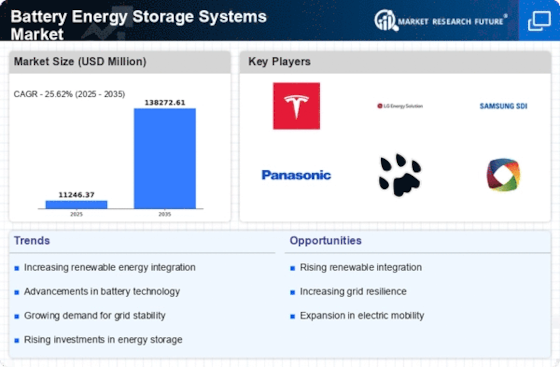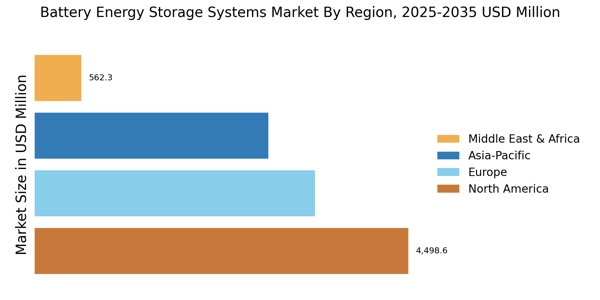Decentralization of Energy Systems
The trend towards decentralization in energy systems is emerging as a significant driver for the Battery Energy Storage Systems Market. As consumers increasingly adopt distributed energy resources, such as rooftop solar panels, the need for localized energy storage solutions becomes apparent. This decentralization allows for greater energy independence and resilience against grid outages. The market for decentralized energy storage is projected to expand rapidly, with estimates suggesting a growth rate of over 15% annually. This shift towards localized energy solutions is likely to enhance the Battery Energy Storage Systems Market, as more individuals and businesses seek to invest in energy storage technologies.
Government Incentives and Policies
Government incentives and supportive policies are critical drivers for the Battery Energy Storage Systems Market. Many governments are implementing financial incentives, tax credits, and subsidies to promote the adoption of energy storage systems. For instance, policies aimed at reducing greenhouse gas emissions and enhancing energy security are encouraging investments in battery storage technologies. In several regions, the implementation of renewable portfolio standards mandates a certain percentage of energy to be sourced from renewables, thereby increasing the demand for energy storage solutions. This regulatory environment is expected to bolster the Battery Energy Storage Systems Market, making it a more attractive investment opportunity.
Increasing Demand for Renewable Energy
The rising demand for renewable energy sources is a pivotal driver for the Battery Energy Storage Systems Market. As nations strive to reduce carbon emissions and transition to cleaner energy, the integration of renewable sources such as solar and wind has surged. This shift necessitates efficient energy storage solutions to manage the intermittent nature of these resources. According to recent data, the renewable energy sector is projected to grow at a compound annual growth rate of over 8% in the coming years. Consequently, the Battery Energy Storage Systems Market is likely to experience substantial growth as it provides the necessary infrastructure to support this transition.
Technological Innovations in Battery Technology
Technological advancements in battery technology are significantly influencing the Battery Energy Storage Systems Market. Innovations such as solid-state batteries and lithium-sulfur batteries are enhancing energy density, lifespan, and safety. These improvements are crucial as they enable more efficient energy storage solutions, which are essential for both residential and commercial applications. The market for advanced battery technologies is expected to reach a valuation of approximately 100 billion USD by 2027, indicating a robust growth trajectory. As these technologies mature, they are likely to drive down costs and improve performance, further propelling the Battery Energy Storage Systems Market.
Rising Energy Costs and Grid Reliability Concerns
The increasing costs of energy and concerns regarding grid reliability are driving the Battery Energy Storage Systems Market. As energy prices fluctuate, consumers and businesses are seeking ways to mitigate costs and ensure a stable energy supply. Battery energy storage systems provide a viable solution by allowing users to store energy during low-cost periods and utilize it during peak demand times. Furthermore, the aging infrastructure of power grids in many regions raises concerns about reliability. Energy storage systems can enhance grid stability and resilience, making them an appealing option for utilities and consumers alike. This trend is likely to contribute to the growth of the Battery Energy Storage Systems Market.


















